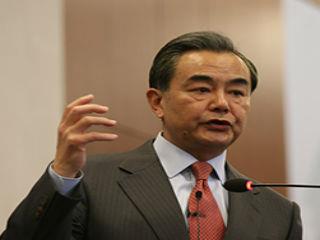Beijing keeps door open for peaceful relations with Taiwan’s new President
Mainland China’s Foreign Minister Wang Yi spoke last week remarkable words


In response to Wang’s remarks Tung Chen-yuan, who was deputy head of the Mainland Affairs Council under the administration of DPP President Chen Shui-bian (2000-2008) and is now a professor at National Chengchi University in Taipei, said Wang’s use of the word ‘constitution’ shows to some extent China’s goodwill.
by
N. Peter Kramer
During his visit to Washington DC, he expressed hope , that Taiwan’s President-elect Tsai Ing-wen (DPP) will, after her inauguration in May, ‘indicate that she wants to pursue the peaceful development of cross-Taiwan Strait relations and that she will accept the provision in Taiwan’s constitution that the mainland and Taiwan belong to one China’.
In response to Wang’s remarks Tung Chen-yuan, who was deputy head of the Mainland Affairs Council under the administration of DPP President Chen Shui-bian (2000-2008) and is now a professor at National Chengchi University in Taipei, said Wang’s use of the word ‘constitution’ shows to some extent China’s goodwill. Only a country can have a constitution, so if China recognises that Taiwan has its own constitution, does that mean that China recognises the existence of Taiwan as a country?
The current Mainland Affairs Council (MAC) in Taipei, still a part of the Kuomintang (KMT) government of President Ma Ying-jeou till his DPP successor Ms Tsai will take over in May, responded also positively saying that it welcomes the move by China to face practically the Republic of China (official name of Taiwan) Constitution. The MAC, however, emphasises that the Taiwan government will never accept Beijing’s ‘one China’ principle. The ROC is a sovereign country and according to its constitution, both side of the strait are two different areas, it added.
Minister Wang’s comments also indicate that Beijing is adjusting its attitude, no longer insists on the term ‘1992 consensus’, and is willing to establish a new basis for cross-strait political interaction with the new DPP government. The ‘1992 consensus’ refers to the basic concept that both countries , Taiwan (ROC) and Mainland China (People’s Republic of China) agree that there is only one China with each side free to interpret what that means.
The incoming DPP administration of President Tsai will have to adequately respond to the change of China’s stance to create a new model of cross-strait interaction that is conducive to peaceful development and prosperity, Mr. Tung added.
Incoming President Tsai has refused to adopt the ‘1992 consensus’ as used during the historical meeting of China’s President Xi Jin-ping and Taiwan’s President Ma in Singapore in November, but has promised to maintain the status quo under the framework of the ROC Constitution and not to provoke Beijing. She has also pledged to pursue good relations with the mainland.




